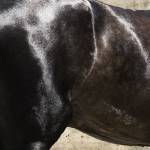Coat Condition

As we emerge out of winter and start getting the rugs off our horses, something we immediately notice is the condition of their coat.
The condition of your horse’s coat certainly provides us with some information about the health of our horses. Long, dry “woody” or “starey” coats that are not shedding often point to a horse with health or nutritional issues.
Addressing the common issues that cause a dull coat can often prevent further decline in health and possible illness. You are best to take a holistic approach to your horse’s wellbeing, addressing: worming, dental care, nutrition and other health issues.
A good place to start in assessing your horse’s worm burden is a “poo sample” (faecal egg count). This information combined with your horse’s worming history and knowledge of the pasture they graze will help in determining what worming treatment is required.
Your horse’s teeth should be assessed and floated every six to 12 months by a qualified professional to ensure they are able to comfortably chew and digest their food.
Older horses (15 years or more) that have long and slow-to-shed coats may have a disease called PPID, or Cushing’s disease. Your veterinarian should be consulted if you suspect PPID as a blood test is required for diagnosis.
Conducting a diet analysis with respect to gut health, vitamin and mineral balance, and essential amino acids is another important aspect of your horse’s health assessment. Nutritional supplements such as Barastoc Groom can assist in filling the dietary gap that may be holding your horse’s coat back. These supplements contain essential amino acids (methionine and lysine), vitamins including the very important B vitamin biotin, and minerals such as zinc and copper. Yeast culture will also aid in promoting the good bacteria in the gut, enhancing utilisation of fibre and minerals.
Another important benefit of such nutritional support is hoof health. Often post the wet conditions and limiting pasture of winter, feet suffer. Fortunately, those things that support a healthy coat will also promote good, strong hoof growth.
I hope this information is helpful and that you are able to admire your healthy horse with their blooming coat in the near future.
Dr Rohan Luxmoore BVSc
Clinic Partner/Equine Veterinarian at Gisborne Veterinary Clinic:
Rohan worked in a variety of practices, including in England, prior to coming to work at GVC. He has become a most welcomed partner in 2003. Rohan has a keen interest in horses, and riding in three-day eventing competitions. He has specialised in equine work with his experienced eye especially useful in assessing performance horses with lameness or gait abnormalities. Rohan has a very relaxed personality and is easy-going in nature. Rohan is married with two young children and an assortment of animals.








